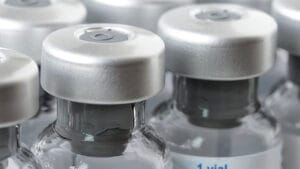What to avoid after flu shot: expert GP advice

If you’ve just had your annual flu vaccine and are wondering what to avoid after flu shot, you’re not alone. Many people feel unsure about what’s safe to eat, drink, or do after their jab — and what might make side effects worse.
At One Medicine, our private GPs regularly answer these questions during private GP appointments. The truth is, most people feel completely fine after their flu jab, but a few simple steps can help you recover comfortably and reduce the risk of side effects.
This article covers everything you need to know: from what to avoid after your flu shot, to what’s safe, and when to contact a doctor if something doesn’t feel right.
Understanding your flu shot
Before we look at what to avoid after flu shot, it’s useful to know what the vaccine does.
The flu vaccine helps your immune system recognise and fight the influenza virus. It doesn’t give you the flu, but it can trigger a mild immune response — which is a good sign the vaccine is working.
Typical short-term effects include:
- Mild arm soreness or swelling
- A slight temperature
- Headache or fatigue for a day or two
These are temporary and generally clear up quickly. You can learn more about how the vaccine works, who should get it, and why, in our detailed guide: Understanding the flu: symptoms, risks and protection.
You can also visit the NHS flu vaccine page for official public health guidance.
What to avoid after flu shot
While you can carry on with your normal day, there are a few sensible precautions that can help your body recover comfortably and ensure the vaccine works effectively.
Here’s a breakdown of what to avoid after flu shot, based on GP-approved recommendations:
1. Avoid heavy exercise immediately after your jab
After your flu vaccine, it’s best to skip intense workouts for 24–48 hours. Strenuous activity can make any arm soreness worse and leave you feeling more tired than usual.
Gentle movement, such as walking or stretching, is perfectly fine. If you enjoy the gym, just give yourself a short break before resuming your usual routine.
2. Avoid pressing or massaging the injection site
If your arm feels sore, it can be tempting to rub or press the area — but this can increase irritation and swelling.
Instead, keep the area clean and dry, and use a cool compress if it feels tender. Most people find the discomfort settles within a couple of days.
3. Avoid alcohol (in large amounts)
A small drink won’t cause harm, but heavy drinking can suppress your immune system and make you feel worse if you’re already a bit tired after your flu shot.
To get the most benefit from your vaccination, try to limit alcohol for 24–48 hours. Staying hydrated with water or herbal teas is much better for recovery.
You can read more about healthy post-vaccine habits on Healthline’s advice page on what to avoid after a flu shot.
4. Avoid skipping meals or rest
It’s easy to underestimate how much energy your immune system uses to respond to a vaccine. Make sure you eat balanced meals, drink plenty of fluids, and get a good night’s sleep.
If you feel slightly achy or tired, listen to your body — rest is one of the best ways to support your immune response.
5. Avoid overusing painkillers unnecessarily
Mild soreness or a low-grade temperature is normal. Paracetamol or ibuprofen can help if needed, but it’s usually best to avoid taking them “just in case”.
Your immune system benefits from responding naturally to the vaccine. Only take pain relief if you genuinely feel uncomfortable, and always follow the dosage instructions.
6. Avoid panic over mild side effects
It’s common to notice small, temporary symptoms after a flu jab — mild fatigue, a sore arm, or slight chills. These are all signs your immune system is responding well.
If you feel anxious, remember: these effects usually pass within 24–48 hours. If symptoms last longer or you develop anything unusual (such as a rash or breathing difficulty), book a private GP appointment for professional assessment.
What’s safe to do after a flu shot
Now that you know what to avoid after flu shot, here’s what you can safely do to help your body recover comfortably:
| Do’s after a flu shot | Why it helps |
|---|---|
| Drink plenty of water | Keeps you hydrated and supports your body’s response to the vaccine. |
| Eat nutritious meals | Provides vitamins and minerals to support your immune system. |
| Apply a cool compress | Helps reduce local swelling and tenderness at the injection site. |
| Keep moving gently | Light activity aids circulation and can ease stiffness without over-exerting you. |
| Rest if needed | Lets your immune system focus on building protection after your jab. |
When to seek medical advice
Most people have no serious side effects after a flu jab. However, you should contact a doctor if you experience:
- Persistent high fever (over 38°C for more than two days)
- Worsening swelling, redness, or pain around the injection site
- Breathing difficulties, dizziness, or rash (rare allergic reactions)
At One Medicine, you can quickly book a same-day private GP appointment for reassurance and personalised advice.
If you ever need urgent medical help, follow NHS guidance or visit your nearest emergency department.
Why OneMedicine is a trusted choice
- Our GPs administer and advise on flu vaccinations every season, helping patients of all ages understand what to do — and what to avoid after flu shot — to stay healthy.
- We combine evidence-based medicine with a patient-centred approach. Our clinicians stay up to date with the latest vaccine safety guidance from the NHS and international health bodies.
- Our flu-related articles, such as Understanding the flu: symptoms, risks and protection, provide medically reviewed information you can trust.
- We value transparency and clear communication. Every patient receives tailored advice on aftercare, lifestyle, and follow-up if needed.
Flu shot aftercare: quick myth check
Even with widespread vaccination, flu myths still circulate. Here’s what you really need to know:
| Myth | Fact |
|---|---|
| “The flu jab gives you flu.” | False — the vaccine uses inactivated virus, so it can’t cause flu-illness. |
| “You only need it once.” | False — strains change, so yearly vaccination refreshes your protection. |
| “No exercise at all afterwards.” | Not true — gentle activity is fine; avoid strenuous workouts for 24–48 hours. |
| “Painkillers stop it working.” | Not exactly — occasional use is fine if needed; avoid taking them “just in case”. |
| “A sore arm means something went wrong.” | Normal — mild soreness is a common, short-lived sign of immune response. |
How One Medicine supports flu prevention
At One Medicine, we offer convenient private GP appointments for flu vaccinations, post-vaccine care, and tailored health checks.
Our GPs provide:
- Same-day and next-day appointments
- Medical advice on flu recovery and immunity
- Access to other essential vaccines
- Ongoing wellness monitoring
If you’re not sure whether the flu jab is right for you this year, or you’ve had side effects before, book an appointment to discuss your options with our team.
You can also explore our flu symptoms and protection guide for a clear overview of how vaccination keeps you safe each winter.
Why your immune response matters
After vaccination, your immune system produces antibodies against the flu virus. This process can take up to two weeks, which is why it’s smart to get your flu jab early in the season.
Supporting your body with rest, hydration, and good nutrition helps build that protection efficiently — another reason it’s important to know what to avoid after flu shot.
Final thought
Knowing what to avoid after flu shot can make all the difference in how smoothly your recovery goes. The flu vaccine is safe, effective, and protects you — and those around you — from serious illness each winter.
For tailored guidance, flu vaccinations, or any follow-up questions, contact One Medicine or book a private GP appointment today.
Stay informed, stay healthy, and give your immune system the best start to the season.
Frequently questions our patients ask
What should I avoid after getting a flu shot?
Avoid strenuous exercise, heavy alcohol, pressing the injection site, and skipping meals or rest. These can increase discomfort or slow recovery.
Can I drink alcohol after a flu shot?
A small drink is fine, but heavy alcohol can weaken your immune response. It’s best to limit or avoid it for 24–48 hours.
Is it safe to work or go to the gym after my flu vaccine?
Most people can go about their day as normal. However, if your arm feels sore or you’re tired, take it easy for a day.
How long after the flu jab can I exercise normally?
Usually within 24–48 hours. Wait until any arm soreness subsides before resuming full workouts.
When should I see a doctor after a flu shot?
If you experience a high fever, prolonged swelling, or allergic symptoms, contact your GP or book a private GP appointment promptly.
















